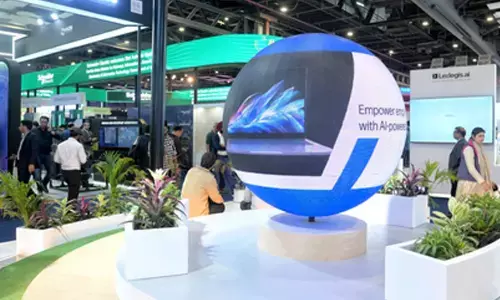Embracing Innovation with AI and IoT-Enabled Gadgets for the Indian Market

AI and IoT are revolutionising India's smart gadgets, enhancing personalisation, connectivity, and productivity, tailored to local consumer needs.
In an interview with The Hans India, Mr Imran Kagalwala, Co-Founder of UNIX India, highlighted the transformative impact of AI and IoT on India's consumer electronics market. As smartphones and internet connectivity proliferate, AI and IoT are revolutionising user interactions with technology. These advancements are creating personalised, intuitive, and interconnected smart gadgets, addressing the specific needs of Indian consumers, and enhancing productivity and connectivity in everyday life.
Mr Imran Kagalwala, Co-Founder of UNIX India
He says that in recent years, India's consumer electronics market has witnessed a rapid evolution, driven by technological advancements and shifting consumer preferences. The proliferation of smartphones and internet connectivity has paved the way for a new generation of smart gadgets that are more intuitive, interactive, and integrated than ever before. This transformation is particularly evident in the realm of Artificial Intelligence (AI) and the Internet of Things (IoT), which are revolutionising the way Indian consumers interact with technology.
Modern gadgets are now equipped with features aimed at enhancing productivity and connectivity. These include regional language support, localised apps, and improved internet connectivity options, specifically catering to the Indian market. The integration of new age technologies (AI&ML) promises even more exciting developments, leading to a personalised smart gadget experience that seamlessly integrates with users' lives, redefining the way we interact with everyday gadgets.
Smart speakers, smartwatches, and smart home devices are a few examples of AI-enabled gadgets gaining traction in India. These devices use machine learning algorithms to learn user behaviour and preferences, offering personalised experiences and automating tasks. Furthermore, decreasing prices are making these technologies more affordable and accessible to a broader audience.
AI personalises user experiences, while Internet of Things (IoT) connectivity enables gadgets to communicate with each other and their environment, creating a truly intelligent ecosystem. In response to this trend and rising demand, the Indian IoT market is projected to reach USD 9.28 billion by 2025, up from USD 4.98 billion in 2020, driven largely by changes in consumer behaviour triggered by the COVID-19 pandemic. This new wave of innovation holds immense potential to address specific needs within the Indian market.
The integration of AI within smartwatches can not only track steps and heart rate but also analyse activity patterns, recommending personalised workout routines that adapt to fitness levels and goals. AI-powered fitness trackers could even offer real-time coaching and motivational prompts, pushing users to achieve their fitness objectives.
Similarly, IoT-enabled wearables and accessories can connect seamlessly with smartphones. This opens doors for features like automatic music playback control through earphones based on activity (such as switching to high-energy music during a workout) or personalised notifications displayed on smartwatches based on context (like priority work emails only during office hours).
The success of AI and IoT-powered wearables and mobile accessories in India hinges on addressing the specific needs of the market. Developing voice assistants for smartwatches that understand regional languages and cultural nuances will be crucial for wider adoption. Additionally, focusing on features that address the challenges faced by the Indian masses will be essential. For mobile accessories, prioritising fast-charging capabilities in power banks and longer battery life in true wireless stereo (TWS) earbuds and neckbands will resonate strongly with Indian consumers.
The Indian market presents a unique opportunity for innovation in the smart wearable and mobile accessory space. By embracing new-age technologies, developers can create a new generation of wearables and accessories that are personalised, seamlessly connected, and tailored to the specific needs of Indian consumers. This wave of innovation has the potential to enhance individual health andwell-being while also contributing to a more connected and efficient mobile experience for the growing Indian user base.
While the future of AI and IoT-powered gadgets in India is bright, there are challenges to address. Security and data privacy are paramount concerns for users. Fortunately, developers are implementing robust security measures and prioritising user control over data. Government initiatives play a crucial role, too. By promoting domestic production of AI and IoT components, India can strengthen its technological independence and create a robust ecosystem for innovation in smart gadgets.








